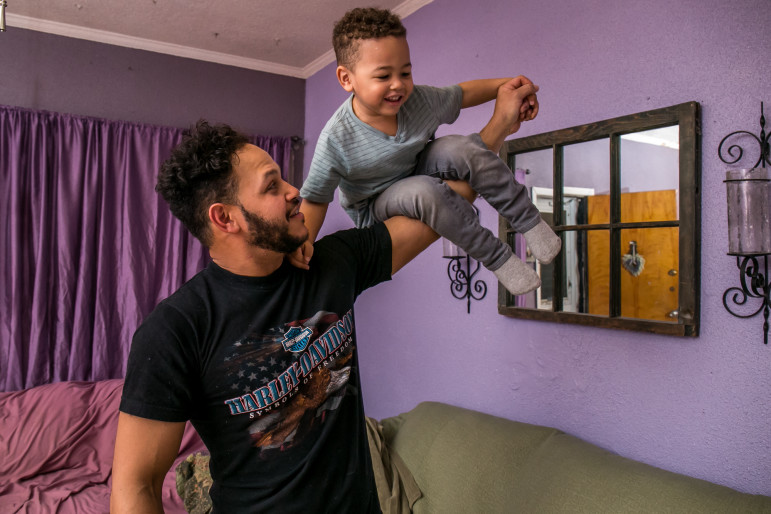
Adi Talwar
Alex Lora with his 3-year-old son, Alexander Lora III, at their residence in Queens, New York. Thanks to a city program that provided a lawyer for him, the elder Lora's immigration case set a new legal standard for others detained in the northeast.
This is the first part of a five-story series on the policy problems and human dramas that characterize immigration court in the New York City area. Be sure to check out the rest of the series.
* * *
When Alex Lora’s phone rang at five a.m. on a frigid November morning in 2013, his first thought was of his mother. She had flown to the Dominican Republic the previous night, and he had fallen asleep thinking about her. He was sure something bad must have happened to her when he heard his brother’s voice piercing through the darkness. Why else would anyone be calling so early in the morning?
At the time, Lora, who has a round face, a sometimes mischievous smile, and a slight Latino lilt, was 31 and staying with his girlfriend in Brooklyn; they took turns caring for Lora’s son with the two-year-old’s mother, Lora’s ex.
“There’s a couple of police officers here looking for you,” his brother told him.
Lora was surprised. He knew he hadn’t done anything wrong. A drug-related brush with the law three years earlier had resulted in probation, and since then he had been a model citizen, checking in with his probation officer regularly. These days, his life was about his son and work. He was starting a new job the next day that he was excited about, in construction.
“There’s a credit-card fraud, and they’re looking for you,” his brother went on. “But I already told them it’s not you.” They were looking for a man with Lora’s name, but the picture of the thief showed a black man. The officers told Lora’s brother that in order to make sure Lora wasn’t behind the crime, they had to set eyes on him.
It seemed fair enough to Lora, especially since he knew he hadn’t done anything wrong. The officers said it would take them 15 minutes to drive over. In the early morning hours, Lora pulled on sweatpants and a sweater and went to wait for the officers on the street corner near his girlfriend’s house.
Lora waited outside for over half an hour. It was freezing, but he waited, anxious to clear up the misunderstanding; he certainly didn’t want someone else’s crimes attached to his name.
Suddenly, Lora had the sense that something wasn’t right. He saw one car arriving, then another, then a third and a fourth across the intersection, and finally a fifth car. About 10 agents converged at the corner where he was waiting, according to Lora’s recollection.
They threw him up against a car, went through his pockets. “Why you gotta treat me like that?” he says he protested. “I’m waiting for you!”
They held up a photo of a black man next to his face, as though checking whether it was him. And then suddenly, the charade was over.
“Don’t worry, it’s not him,” an officer said. “But this is him,” he said, pulling out another document. And it was then that the officer, according to Lora’s recollection, told him why they were really there.
“You’re going to get deported.”
More than two years later, Lora’s case would reshape the way immigration courts in the northeast treat so-called “criminal aliens.” The legal saga that led there exposes the deep flaws in the system by which the federal government decides whether an undocumented immigrant gets a warm welcome or a ticket home.
Detained today for a crime 20 years ago
Lora had come to the United States from the Dominican Republic 24 years earlier, when he was seven years old. In July of 2009, he had been arrested with a co-worker and charged with several New York state offenses relating to cocaine possession. A year later, in July of 2010, he pled guilty and was sentenced to five years of probation. He thought he had resolved that conviction by serving probation; he was not sentenced to any jail time. But unbeknownst to him, he had been living with a sword hanging over his head. And his reprieve had just run out.
The officers—agents of Immigration and Customs Enforcement, known as ICE— shackled his wrists to a chain around his waist, in front of neighbors who had come out to the street to see what the ruckus was about.
Lora was embarrassed, and in shock. The officers told him he was going to do his time and go “back home.” Lora asked them again and again, “Time for what? I didn’t do anything wrong!”
After picking up two other immigrants, the officers drove Lora to 201 Varick Street in SoHo where he was questioned. Then they drove him to Hudson County Correctional Center in New Jersey, where some of New York’s immigrant detainees are held. At 2 a.m., nearly 24 hours after he had been woken up, Alex Lora became an immigrant detainee with no trial date and no stated term limit.
An immigrant to the United States who commits any of a wide variety of crimes can at any time thereafter be deported—even if they are a green card holder or a legal permanent resident—so long as they are not a citizen.
A long list of crimes make immigrants to the United States deportable, from murder, rape, and child pornography, to possession of an illegal firearm, stalking, driving under the influence, and drug offenses beyond “a single offense involving possession for one’s own use of 30 grams or less of marijuana.” Even some misdemeanors—crimes the state has decided are low-level—can trigger mandatory detention and deportation. There is also a category unique to immigrants called “crimes of moral turpitude”— interpreted rather broadly—which can trigger deportation.
The Obama Administration has deported over 2 million people—more than any other president in the history of this country. In 2013 alone, DHS deported 200,000 criminal immigrants. And though Obama claimed to be going after criminals and “gang-bangers,” a 2014 New York Times article found that two-thirds of the deportation cases involved people who had committed minor infractions, including traffic violations, or had no criminal record at all. Removals for traffic violations like driving under the influence have quadrupled from 43,000 under President Bush to a staggering 193,000 during the current administration.
Though he was a lawful permanent resident and his mother a U.S. citizen, Lora’s crime was classified as an “aggravated felony”—a term unique to immigration law, which meant he was subject to mandatory detention for the duration of his deportation case. All anyone would tell him was that he would be there until he was deported to the Dominican Republic.
New laws in 1996 expanded the list of crimes that trigger mandatory detention to include all drug offenses. By 2009, ICE was detaining close to 400,000 non-citizens every year, two thirds of them subject to mandatory detention.
Many tell stories like Lora’s, of being cornered by a multitude of officers. ICE would not independently confirm or deny this; “In order to maintain operational security we do not discuss the number of ERO officers involved in an enforcement action,” a spokesperson wrote in an email, though he insisted that when officers make an arrest, “the safety of the officers and the person arrested is always a priority.” Many detainees also claim, as Lora doe, that ICE agents lied to them. ICE could not confirm or deny this either. “We do not discuss law enforcement tactics,” the spokesperson wrote. As to why detainees are shackled, the spokesperson wrote, “For the safety of the public, the officers and the detainees themselves, adult individuals in ICE custody are restrained while transported to or from ICE facilities.” (ICE also declined my request to interview an enforcement agent.)
Because immigration is considered a civil rather than a criminal matter, detainees (or “respondents” as they are called in court) are not guaranteed certain due process rights afforded in criminal matters. For example, there is no statute of limitations on crimes committed by immigrants; over the course of reporting this story, I met people who had been detained for six months for a crime committed over twenty years ago. And the standards of evidence are much laxer in immigration court than they are in criminal court; the judge can consider any evidence he wishes. Lawyers complain that hearsay regularly enters proceedings.
Furthermore, immigrants are not afforded a lawyer by the courts; they may procure a lawyer, but the court is not obligated to provide one if they can’t afford it. Eighty-four percent of all detained immigrants end up representing themselves.
But perhaps most shocking of all is the fact that immigrants are denied one of the most basic civil rights protected by the constitution: they are detained without a bond hearing. Bond, or bail, is one of the most fundamental ideas of our criminal justice system, preserving the idea that defendants are presumed innocent until proven guilty. Not so immigrant detainees. While they may petition the court for a bond hearing, there are so many offenses that trigger mandatory detention that all too frequently, the judge’s hands are tied.
“Why don’t you go home?”
Life in the Hudson was brutal. Lora slept in a room with 64 other people, a room where the lights never went out, even at night, where he was only allowed to leave for a half hour every day. People talked incessantly, yelled, started fights out of sheer boredom or because they were mentally ill. The stress of not knowing how long they would be there or if they would ever see their loved ones again put everyone on edge. The food was nearly inedible; Lora begged for a vegan diet, but he says he had to appeal to the chaplain to actually get it. They weren’t allowed to go outside, except for half an hour each day, when they were shepherded into a tiny enclosed balcony with cinder block walls on two sides and glass doors to the dorm on the third..(A 2012 report found the conditions at Hudson to be worse than those at Rikers’ Island; many detainees complained of being called “animals” by correctional officers.) The detainees sat in the same room all day with nothing to do, with the constant threat that they were going to be sent back to countries that many hadn’t seen in years.
There were men who had been in detention for over three years; they were always on edge, always ready to swing at the slightest provocation. Lora didn’t understand how they could bear it, or why they didn’t sign a voluntary departure order and leave the U.S., if only to get out of detention.
“Why don’t you go home?” he would ask them.
“I got no one there,” they would tell him.
A month in, Lora learned that the mother of his child had tried to commit suicide, and his two-year-old son joined thousands of children placed in foster care when their parents are either detained or deported. The mental stress was nearly unbearable.
But the worst part about it by far was the feeling he had done nothing wrong—that he had paid his debt to society and satisfied the criminal justice system, and was now being punished a second time, suddenly deemed a danger to society not because of the crime he had committed but because of where he happened to be born.
At some point, Lora couldn’t stand it anymore. Desperate for relief, he was on the verge of giving up, signing a voluntary departure agreement, and heading back to the DR.
Immigrants’ Fates Depend
on Access to Lawyers
City Limits is grateful to the readers who donated to create this project along with the generous underwriting of Beacon.
* * *









2 thoughts on “Heavy Burdens and Unfair Fights in Immigration Courts”
So he has a felony drug conviction and he is an illegal alien? Well guess what? The US wants the best and brightest, not criminal scumbags.
What’s next, the story about the ‘family man’ illegal alien who murdered 6 people in a gun fight?
He already paid for his crime. It isn’t fair that he was treated this way only because he was an immigrant.